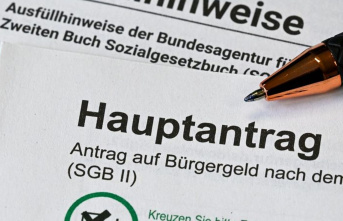Energy price brakes, right of residence, energy flat rate for students, voting age 16 for European elections - the Federal Council approved numerous legislative projects in its last session of the year. It was noticeable at the meeting that the Federal Government's constant requests for the deadlines to be shortened in the deliberations in the chamber of the federal states are increasingly causing dissatisfaction.
The Federal Council commemorated the Sinti and Roma who were persecuted and murdered by the National Socialists between 1933 and 1945. That was half a million people, said its President Peter Tschentscher (SPD). "Nevertheless, the Federal Republic of Germany did not recognize this genocide as such for a long time."
The most important resolutions of the State Chamber in detail:
ENERGY PRICE BRAKES
The price brakes for electricity and gas are coming. They are intended to cushion the consequences of the sharp rise in prices for consumers and companies. The brakes are to apply to private households and small and medium-sized companies from March, with retrospective relief planned for January and February. The prime ministers had previously put pressure on them to ensure that there should be no "winter gap" in the relief. Lower Saxony's head of government, Stephan Weil (SPD), said he was glad that there was a continuous relief path. However, his colleague Hendrik Wüst (CDU) from North Rhine-Westphalia criticized that there was a "justice gap" with oil and pellets.
ENERGY FLAT RATE FOR STUDENTS
Students and technical students receive an additional one-off subsidy of 200 euros. The chamber of the federal states decided not to call the mediation committee, despite major differences with the federal government about the practical implementation of the project. The approximately 3.4 million people affected will have to be patient. As of now, it is unclear when they will get the money. Work is still in progress on a planned online application platform. Employees had already received a one-time payment of 300 euros in the fall, pensioners at the beginning of December.
ANNUAL TAX ACT
The Federal Council approved the annual tax law with comprehensive tax changes. However, this does not include an increase in the allowances for inheritance tax. Bavaria failed with an application to call the mediation committee of the Bundestag and Bundesrat. The country calls for a regionalization of the inheritance tax and higher allowances - but finds no supporters in the other countries. The revenue from this tax goes to the federal states alone. State Secretary for Finance Katja Hessel (FDP) pointed out that an increase in the allowances requires a majority in the federal states. Finance Minister Christian Lindner (FDP) has proposed an increase of 25 percent.
OPPORTUNITIES RESIDENCE
The right of residence is clearly reformed. Well-integrated foreigners who have been living in Germany for years without a secure status are given a perspective with the so-called right of residence. Anyone who has lived in the country for five years as of October 31, 2022 and has not committed a crime should have 18 months to meet the requirements for long-term residence. This includes, for example, knowledge of German and securing your own livelihood. "With this law, we are opening a new chapter in migration and integration policy," said Parliamentary State Secretary in the Federal Ministry of the Interior, Rita Schwarzelühr-Sutter, in the state chamber.
KITA FUNDING
The federal government will support the federal states in the next two years with almost 3.9 billion euros in financing their day-care centers. The Federal Council approved the so-called Kita Quality Act of the traffic light. It follows on from the so-called Good Daycare Act of the previous government, through which the federal government had also made money available. Actually, the day-care centers are a matter for the federal states. The funds are intended for investments in quality, for example to promote early childhood education, good nutrition or language development. In order to accommodate the states, the federal government had made changes. Unlike initially planned, he will continue to finance the "Language Daycare Centers" funding program until the summer of 2023.
VOTING AGE IN EUROPEAN ELECTIONS
In the next European elections in 2024, 16 and 17-year-olds in Germany can also take part. The Bundesrat approved the lowering of the voting age from 18 to 16, which had already been decided by the Bundestag. It is the younger generation that is most affected by central political issues such as environmental protection, climate change, education or social justice, said North Rhine-Westphalia's Family and Integration Minister Josefine Paul (Greens). Your future will be shaped by these topics. "The younger ones must therefore also be able to have a say and help shape things."
SANCTIONS ENFORCEMENT
The enforcement of EU sanctions, for example against Russia, is to be improved and money laundering in Germany curbed. The Sanctions Enforcement Act II, approved by the Bundesrat, provides for the establishment of a central agency at federal level for sanctions. And: In the future, real estate in Germany can no longer be paid for with cash. In the past, criminally acquired funds were often laundered in this way. Germany is a popular money laundering location for criminals. "Germany has some catching up to do here," said Schleswig-Holstein's Finance Minister Monika Heinold (Greens).
TRADE AGREEMENT CETA
After the Bundestag, the Bundesrat also approved the ratification of the EU CETA trade agreement with Canada. It is intended to facilitate trade between companies in the EU and Canada by eliminating almost all customs duties and through common rules. Parts of Ceta have been in force provisionally since September 2017 - but only in those areas for which the EU alone is responsible and not the member states. The other parts are on hold pending ratification.
LIVESTOCK FARMING
Expanded legal regulations for the use of antibiotics in animal husbandry come into effect in the new year. After the approval of the Federal Council, the use of antibiotics must in future also be recorded in farms with other animals such as dairy cows and laying hens. The aim is to generally reduce use in stables.












